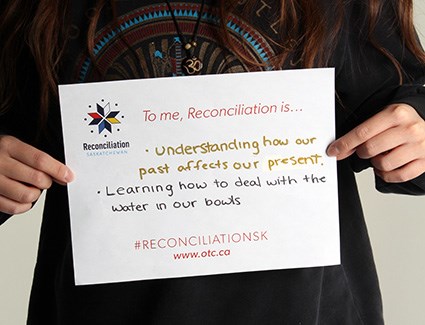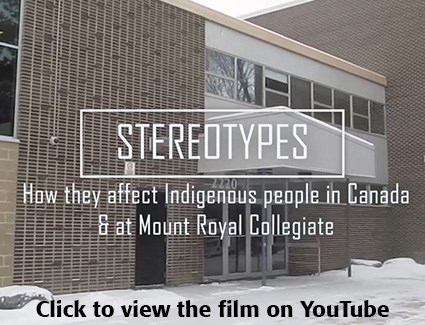 When students in Mount Royal Collegiate's Indigenous Studies 30 classroom were asked to examine the social issues that affect their lives and community, they turned the focus on their school.
When students in Mount Royal Collegiate's Indigenous Studies 30 classroom were asked to examine the social issues that affect their lives and community, they turned the focus on their school.
"A major outcome in Indigenous Studies 30 is looking at social development," said teacher Jody Lerat, who is from Cowessess First Nation. "Everybody in the class had to choose their own social issue or social topic that affects Indigenous people in Canada. I gave them a huge list to choose from and everyone in the class chose different topics, with the end goal of educating each other about our topics."
"My focus was to have them look at the big picture of Canada, narrow it down to how it affects Indigenous people in Saskatoon, and then take it even further: how does it affect students at Mount Royal?"
The result was a series of video projects that examined subjects such as substance abuse, two-spirit narratives, residential schools and the resulting intergenerational trauma, government policy toward Indigenous people, and missing and murdered Indigenous women — all issues that affect the lives of students. Last, the class ended with a photo essay featuring students in the class, as well as members of Mount Royal's staff, which gave a face to what reconciliation means to people in the school community.
One of the final short films, "Stereotypes: How they affect Indigenous people in Canada & at Mount Royal Collegiate", was the recipient of a City of Saskatoon Living in Harmony award. The film, shot by Reshai Aisaican with the help of Mickey Laliberte and Taylor Larocque, asks students how they view themselves as Indigenous people. When they are asked to share the stereotypes that are used by others to describe Indigenous people the students' words are blunt and honest.
"People ask me questions like 'Do you still live in a tipi,'" says Chaston Dustyhorn with a laugh. "I tell them 'Nope, I live in a house just like you.'"
"Indigenous people are not educated. They are drunks and junkies and they don't know how to take care of their children," says Makayla Musaskapoe, who sees her life experience as a counterpoint to the words used to describe Indigenous people. "I am sitting here today at Mount Royal Collegiate, getting my education."
"I've never wished I wasn't Indigenous, but I do wish there were no stereotypes toward Indigenous people," says Musaskapoe.
 The film investigates how students and staff at Mount Royal respond to and examine the effect of such stereotypes and how those negative viewpoints affect their lives. It also demonstrates how relationships between students and teachers can have a positive impact on students; because students went to teachers they trusted on this sometimes controversial topic.
The film investigates how students and staff at Mount Royal respond to and examine the effect of such stereotypes and how those negative viewpoints affect their lives. It also demonstrates how relationships between students and teachers can have a positive impact on students; because students went to teachers they trusted on this sometimes controversial topic.
The use of video was an alternative to the traditional essay format as an option for the assignment, and photography was used to create the final project to wrap up the class. Lerat believes it provided a unique opportunity for students to have their voice heard beyond the classroom.
"Students are used to writing essays, but I wanted to show them that through various art forms you can share, or amplify, your voice," she said. "I don't think that they were prepared for the outcome of that: what that would feel like, both in seeing themselves in the documentaries or seeing themselves in the photos, also their statement being seen by others. I think it was a surprise, not expecting their work to be seen, their voices to be heard."
Lerat believes youth have important stories to share and that they offer an important perspective as Indigenous youth who live in a socioeconomic climate where issues such as stereotypes, addiction, and poverty have a first-hand effect on many of their lives. She also believes it is vital that teachers take part and show youth that they care and want to be a part of creating an anti-racist, anti-oppressive future with reconciliation in mind.
"A lot of students at this school are going through many issues that even as adults it is really hard to comprehend, especially if we didn't grow up like they did" she said. "It is really hard as adults sometimes, and even as teachers in this building, to understand where they are coming from. But when we let them talk about it or let them speak to it then they are going to realize that they, as youth, can overcome it."
"Their voice is incredibly important. Their perspectives, their worlds, are difficult so why shouldn't they have an avenue to express that?"